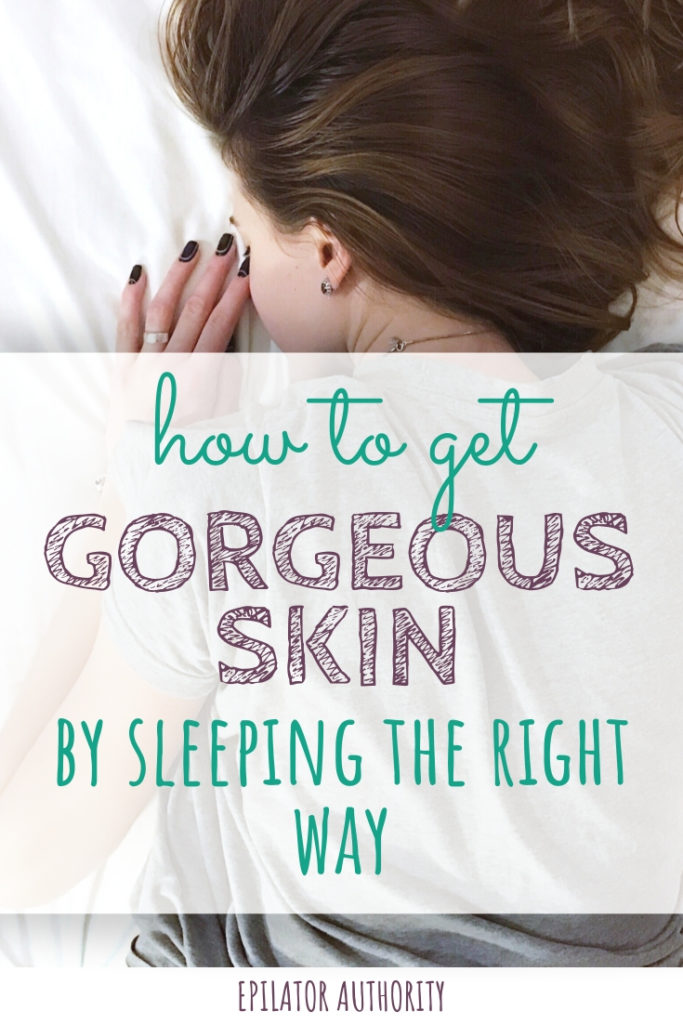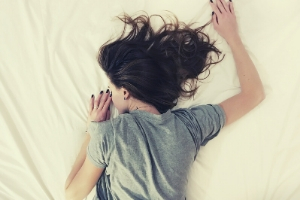After years of trying various hacks for skincare, I finally realized the component that makes or breaks all the others: sleep.
I can use #allthethings in attempts to make my skin look good while still hating what I’m seeing in the mirror. Then some days, I neglect my skin yet get high-quality sleep at the right times and my skin magically looks ten times better.
So what is the best time to sleep for skin? According to sleep researchers, the best time to sleep for skin benefits is between 8 PM and midnight. You’ll get the most benefits if you get 7 to 9 hours each night and keep your sleep and wake times consistently the same each day.
Why is this time the best for sleeping? And what happens to your skin when you get high-quality sleep at this time? Read on to find out.
The Optimal Time to Sleep
We sleep in cycles of 90 minutes. During each cycle, we go through all four stages of sleep, including three stages of slow-wave sleep and one stage called REM (rapid eye movement) sleep.
Although all stages of sleep provide different benefits, many researchers believe that the first three stages may provide most of the restorative benefits of sleep.
This is important to note because, after midnight, your cycles tend to have longer periods of REM sleep, cutting short the non-REM sleep. So if you fall asleep after midnight, you may be missing out on the optimal levels of non-REM sleep.
According to Matthew Walker, a sleep researcher at the Sleep and Neuroimaging Lab at the University of California, Berkeley, “When it comes to bedtime, there’s a window of several hours, roughly between 8 PM and 12 AM, during which your brain and body have the opportunity to get all the non-REM and REM shuteye they need to function optimally.”
This means that you need to be getting to bed by midnight if you want all the restorative benefits of sleep (including the restorative benefits for the skin).
Benefits of Sleep for Your Skin
Research has shown again and again that sleep in crucial to looking your best. Just one night of poor sleep can cause swollen eyes, droopy eyelids, undereye circles, paler skin, droopy mouth corners, and wrinkles or fine lines.
In addition to this, sleep deprivation will make your skin age faster. This is because your skin repairs and replenishes itself each night. And every night you skip out on a good 7 to 9 hours, you are adding unnecessary age to your skin.
Yes, just one night! But on the flip side, it just takes one good night of sleep to improve the appearance of your skin and put a stop to that pre-mature aging.
How to Get High-Quality Sleep
As you know now, for your skin to look it’s best, you should be falling asleep between 8 PM and midnight. You also should be sleeping getting 7-9 hours each night, no matter what.
These two elements sleeping well are a good start, but there is much more you can do to make sure you get the highest quality of sleep and therefore, the most benefits for your skin.
Stay Regular
Regularity is the key to beating insomnia and ensuring you are falling into a deep, restorative sleep that fully renews your body and mind. This means you need to be going to sleep and waking up at the same time every single day, including weekends.
When you miss out on enough sleep, even for one day, you will never be able to completely make up for the consequences on your body and skin. Although the consequences of losing sleep for one night is pretty insignificant, they do add up over many nights and many years.
Besides that, when you are waking up and going to sleep at different times, you essentially are giving yourself jet lag. Your body will not be primed to sleep as well because your circadian rhythm will be constantly resetting. Our bodies aren’t meant to do this.
So at least commit to waking up at the same time every single day and then listen to your body in the evenings. It will tell you when it’s time to go to sleep.
Keep Cool
Humans evolved before climate-controlled buildings. Cooler air after the sunset signaled to the body that it was time to sleep.
Now our bodies still need that signal, but our environment doesn’t always provide it.
The best way to fix this problem is to make sure the thermostat is set to a cooler temperature at night. 67 to 72 degrees works for most people, but you may have to experiment until you find the ideal temperature for your body.
If you are in a dorm room, apartment, or some other arrangement where you can’t change the temperature at night easily, you can try sleeping with a cooling pad or blanket like the Elegear Cooling Throw Blanket (click to see images and reviews Amazon).
Embrace Darkness
Artificial light, especially from devices like computers and smartphones, has a major impact on sleep quality. Screen time in the hour before you go to sleep will reduce melatonin production. This is the hormone that helps you fall asleep and stay asleep.
So definitely put the smartphone or iPad away at least an hour before you plan to fall asleep. Reading a book in dim light is a better option.
In addition, if you live in an urban area where city lights keep your street bright all night, make sure you have curtains or blinds that block it out so your room can get sufficiently dark.
Avoid Alcohol and Caffeine
According to sleep researcher Matthew Walker, caffeine intake has been shown to reduce deep sleep by 20% in studies. So even if you have no problem falling asleep after drinking caffeine, you are not getting the full restorative benefits of sleep for your skin.
“I would probably have to age you by about 30 years to get that type of a drop in deep sleep. Or you could do it every night with a cup of coffee with dinner,” Walker stated in an interview by Chris Kesser.
Since caffeine will still be in your blood even after 12 hours, it’s best to avoid it completely. But if you’ve gotta have your morning java, limit it to your first hour in the morning to minimize its effects on your sleep.
Along the same line, alcohol is problematic too. It fragments sleep, limiting its restorative effects. So if you want to avoid it most of the time as well, especially right before bed.
Don’t Chill in Your Bed
Your nervous system is always working in the background, taking in environmental cues and then reacting to them. If it associates your bed with sleep, this will make falling asleep and staying asleep so much easier.
This is why it’s important to not hang out in your bed unless you are sleeping or will be sleeping very soon.
If you are lying in bed and just can’t fall asleep after 20 or 25 minutes, then it’s best to get up and go to another room. Do a quiet activity in dim light until you get sleepy. Then you can go back to bed.
Final Takeaways
Good sleep is the component missing out of almost everyone’s skincare routine. To get the biggest benefits for your skin, get to sleep between 8 PM and midnight and sleep for at least 7-9 hours each night.
You should also work on increasing the quality of your sleep by having a consistent bedtime and wake time, sleeping in a cool room, and avoiding artificial light, caffeine, and alcohol.
Lastly, make sure that sleep is the main activity of your bedroom to condition your nervous system to fall asleep easily when you hit the sack.
Want to remember this? Pin this to your favorite Pinterest board so you can find it later!

References
Chris Kresser: Why We Need Sleep with Dr. Matthew Walker
Clinical and Experimental Dermatology: Does Poor Sleep Quality Affect Skin Ageing?
Sleep: Cues of Fatigue: Effects of Sleep Deprivation on Facial Appearance
